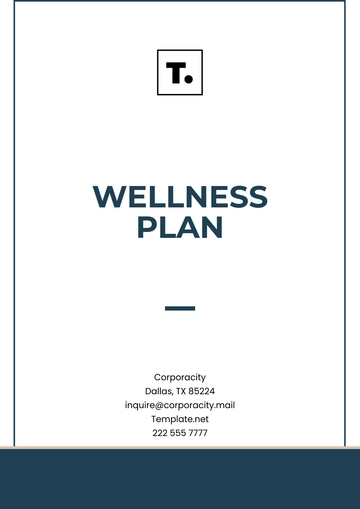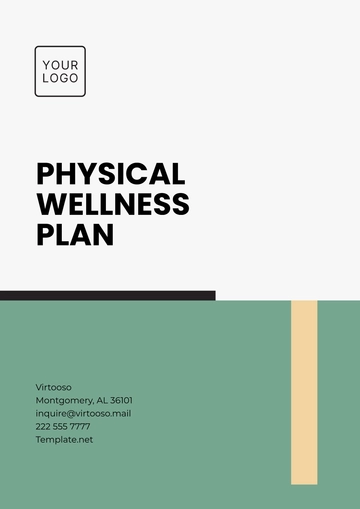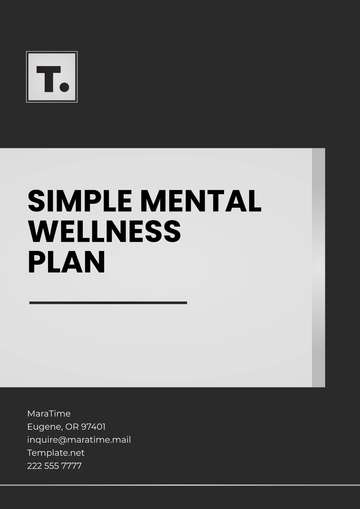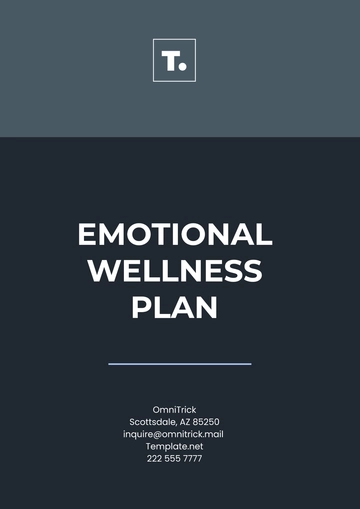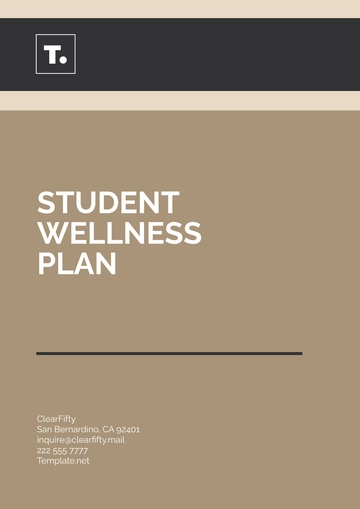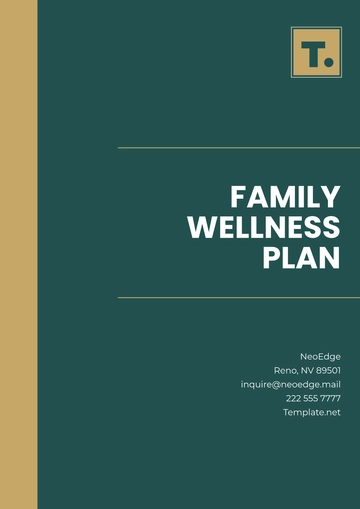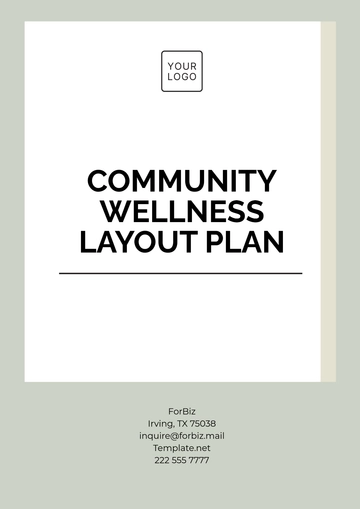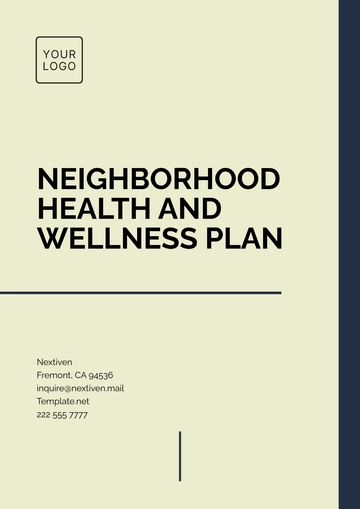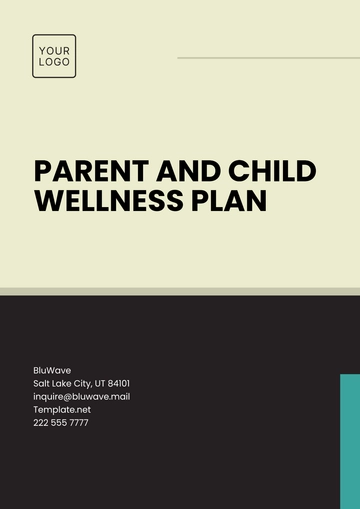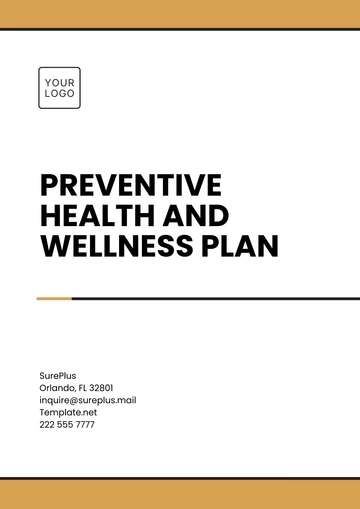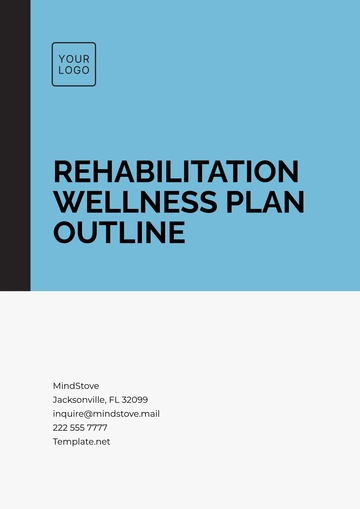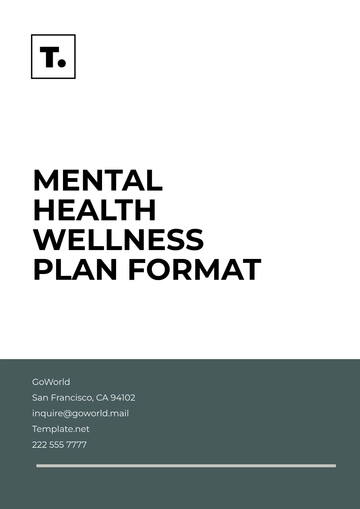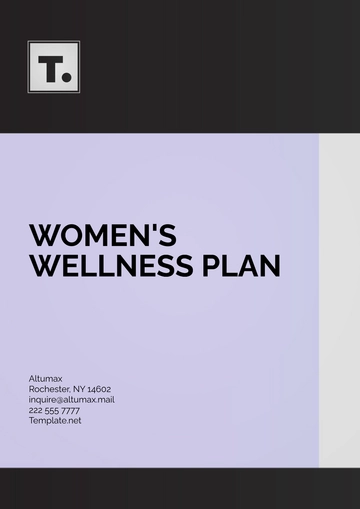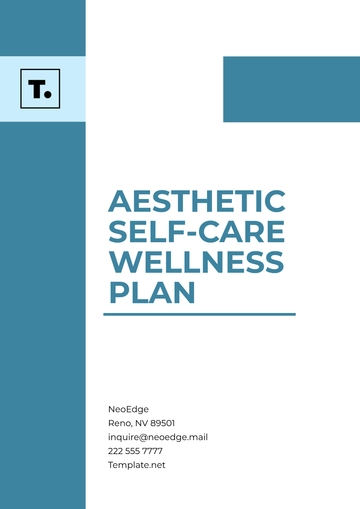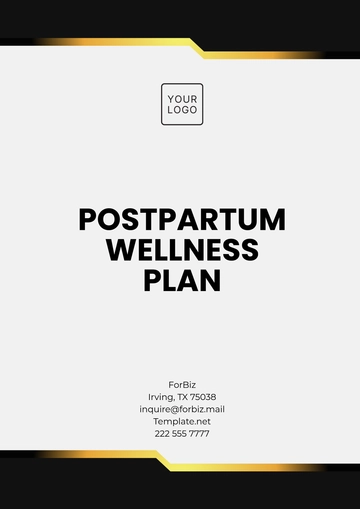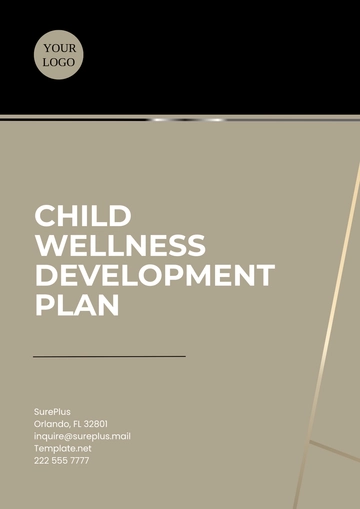Free Simple Mental Wellness Plan
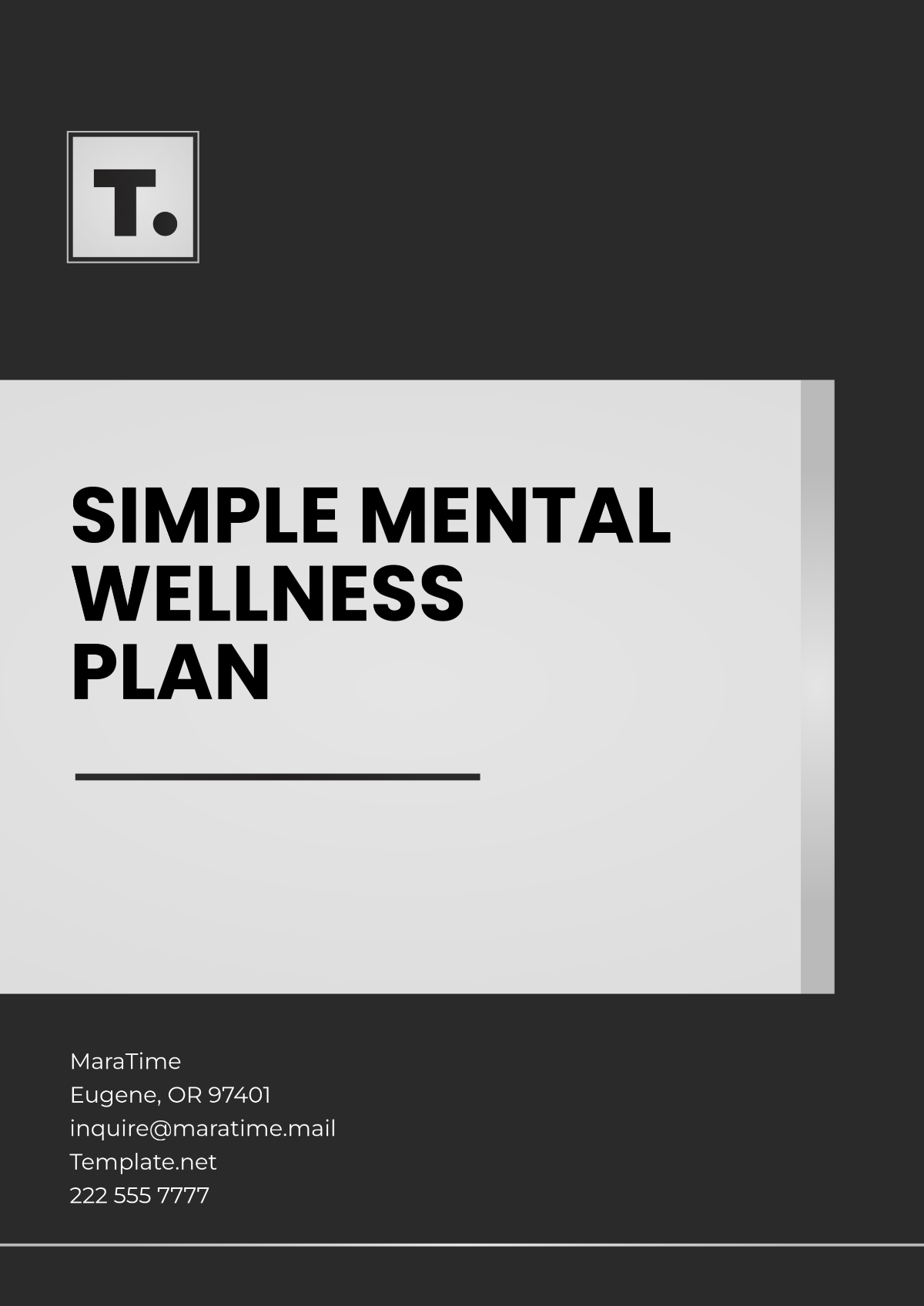
Prepared by: [Your Name]
Company: [Your Company Name]
Date: [Insert Date]
I. Introduction
Mental wellness is essential for maintaining balance, resilience, and overall quality of life. This Mental Wellness Plan is designed to provide simple, actionable strategies to support mental health, reduce stress, and promote a positive mindset. By creating a nurturing environment and offering practical tools, this plan aims to help individuals build emotional strength and mental clarity.
II. Vision and Goals
Vision:
To create a supportive environment where individuals feel valued, connected, and empowered to prioritize their mental well-being.
Goals:
Reduce stress and anxiety through proactive measures.
Foster a culture of openness and mental health awareness.
Provide accessible resources for emotional and mental support.
Encourage habits that promote mindfulness and relaxation.
III. Key Strategies and Initiatives
1. Stress Management Support
Workshops: Offer monthly stress management webinars or in-person sessions focusing on relaxation techniques.
Quiet Zones: Create designated spaces for meditation, mindfulness, or quiet reflection.
Relaxation Resources: Provide access to apps or guides for deep breathing exercises, progressive muscle relaxation, and mindfulness practices.
2. Counseling and Support Services
Access to Counseling: Partner with mental health professionals to offer free or subsidized therapy sessions.
Peer Support Groups: Establish peer-led groups for sharing experiences and mutual support.
Hotline Resources: Share contact information for mental health hotlines and crisis intervention services.
3. Mindfulness and Emotional Wellness Practices
Daily Mindfulness Practices: Encourage individuals to take 5–10 minutes daily for journaling, gratitude exercises, or meditation.
Digital Detox Challenges: Organize monthly challenges to reduce screen time and improve focus.
Gratitude Wall: Create a shared space where individuals can post positive thoughts or achievements.
4. Mental Health Awareness
Educational Campaigns: Share weekly articles, videos, or tips on topics like managing stress, recognizing burnout, and practicing self-care.
Mental Health Days: Promote the use of designated mental health days for rest and rejuvenation.
Breaking Stigma: Host open discussions or panels to normalize conversations around mental health.
5. Social Connection
Team-Building Activities: Organize fun, informal events like game nights or coffee breaks to strengthen connections.
Volunteer Opportunities: Offer group community service projects to foster a sense of purpose and collaboration.
Interest-Based Clubs: Encourage the formation of clubs or groups centered around hobbies, such as book clubs or fitness groups.
IV. Implementation Plan
Roles and Responsibilities:
Wellness Team: Oversee the execution of initiatives and provide ongoing support.
Participants: Engage in available programs and share feedback.
Leadership: Promote mental wellness as a priority and provide necessary resources.
Timeline:
Phase 1 (Month 1): Assess needs and plan initial activities.
Phase 2 (Months 2–6): Launch core initiatives such as mindfulness sessions and counseling access.
Phase 3 (Months 7–12): Expand programs, collect feedback, and measure success.
V. Measurement and Evaluation
Key Performance Indicators (KPIs):
Participation rates in wellness programs.
Self-reported stress and anxiety levels (via surveys).
Feedback on the perceived impact of programs.
Evaluation Methods:
Conduct quarterly surveys to gather insights and feedback.
Track attendance and engagement in events and workshops.
Prepare an annual report summarizing successes and areas for improvement.
VI. Sustainability Plan
Establish long-term partnerships with mental health professionals and organizations.
Rotate wellness leaders to ensure fresh ideas and perspectives.
Regularly update the plan based on participant feedback and emerging needs.
Explore digital tools like apps or platforms to streamline access to resources.
VII. Conclusion
This Mental Wellness Plan offers a simple yet comprehensive approach to nurturing mental health and emotional resilience. By focusing on stress management, emotional support, mindfulness, and social connection, it empowers individuals to prioritize their mental well-being and build a positive, balanced lifestyle.
Together, we can create a culture of mental wellness that supports personal growth, reduces stress, and enhances overall happiness for everyone involved.
Implementing a simple mental wellness plan can significantly enhance your quality of life. Consistency is key; therefore, make these practices part of your daily routine to experience continuous improvement in your mental well-being.
- 100% Customizable, free editor
- Access 1 Million+ Templates, photo’s & graphics
- Download or share as a template
- Click and replace photos, graphics, text, backgrounds
- Resize, crop, AI write & more
- Access advanced editor
You may also like
- Finance Plan
- Construction Plan
- Sales Plan
- Development Plan
- Career Plan
- Budget Plan
- HR Plan
- Education Plan
- Transition Plan
- Work Plan
- Training Plan
- Communication Plan
- Operation Plan
- Health And Safety Plan
- Strategy Plan
- Professional Development Plan
- Advertising Plan
- Risk Management Plan
- Restaurant Plan
- School Plan
- Nursing Home Patient Care Plan
- Nursing Care Plan
- Plan Event
- Startup Plan
- Social Media Plan
- Staffing Plan
- Annual Plan
- Content Plan
- Payment Plan
- Implementation Plan
- Hotel Plan
- Workout Plan
- Accounting Plan
- Campaign Plan
- Essay Plan
- 30 60 90 Day Plan
- Research Plan
- Recruitment Plan
- 90 Day Plan
- Quarterly Plan
- Emergency Plan
- 5 Year Plan
- Gym Plan
- Personal Plan
- IT and Software Plan
- Treatment Plan
- Real Estate Plan
- Law Firm Plan
- Healthcare Plan
- Improvement Plan
- Media Plan
- 5 Year Business Plan
- Learning Plan
- Marketing Campaign Plan
- Travel Agency Plan
- Cleaning Services Plan
- Interior Design Plan
- Performance Plan
- PR Plan
- Birth Plan
- Life Plan
- SEO Plan
- Disaster Recovery Plan
- Continuity Plan
- Launch Plan
- Legal Plan
- Behavior Plan
- Performance Improvement Plan
- Salon Plan
- Security Plan
- Security Management Plan
- Employee Development Plan
- Quality Plan
- Service Improvement Plan
- Growth Plan
- Incident Response Plan
- Basketball Plan
- Emergency Action Plan
- Product Launch Plan
- Spa Plan
- Employee Training Plan
- Data Analysis Plan
- Employee Action Plan
- Territory Plan
- Audit Plan
- Classroom Plan
- Activity Plan
- Parenting Plan
- Care Plan
- Project Execution Plan
- Exercise Plan
- Internship Plan
- Software Development Plan
- Continuous Improvement Plan
- Leave Plan
- 90 Day Sales Plan
- Advertising Agency Plan
- Employee Transition Plan
- Smart Action Plan
- Workplace Safety Plan
- Behavior Change Plan
- Contingency Plan
- Continuity of Operations Plan
- Health Plan
- Quality Control Plan
- Self Plan
- Sports Development Plan
- Change Management Plan
- Ecommerce Plan
- Personal Financial Plan
- Process Improvement Plan
- 30-60-90 Day Sales Plan
- Crisis Management Plan
- Engagement Plan
- Execution Plan
- Pandemic Plan
- Quality Assurance Plan
- Service Continuity Plan
- Agile Project Plan
- Fundraising Plan
- Job Transition Plan
- Asset Maintenance Plan
- Maintenance Plan
- Software Test Plan
- Staff Training and Development Plan
- 3 Year Plan
- Brand Activation Plan
- Release Plan
- Resource Plan
- Risk Mitigation Plan
- Teacher Plan
- 30 60 90 Day Plan for New Manager
- Food Safety Plan
- Food Truck Plan
- Hiring Plan
- Quality Management Plan
- Wellness Plan
- Behavior Intervention Plan
- Bonus Plan
- Investment Plan
- Maternity Leave Plan
- Pandemic Response Plan
- Succession Planning
- Coaching Plan
- Configuration Management Plan
- Remote Work Plan
- Self Care Plan
- Teaching Plan
- 100-Day Plan
- HACCP Plan
- Student Plan
- Sustainability Plan
- 30 60 90 Day Plan for Interview
- Access Plan
- Site Specific Safety Plan
